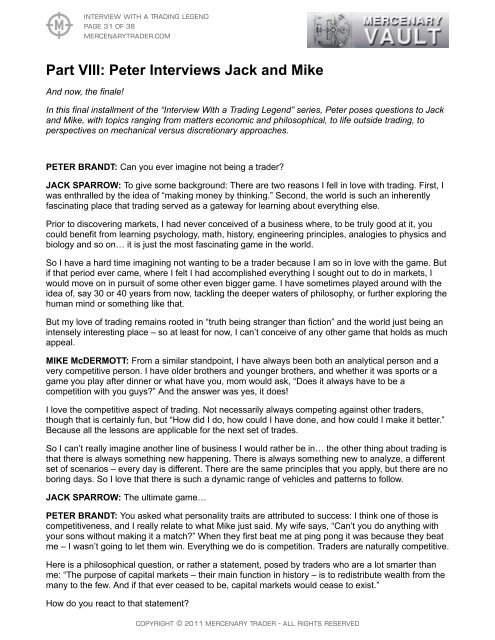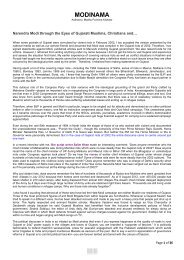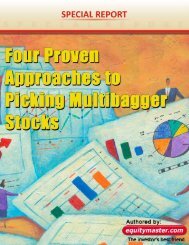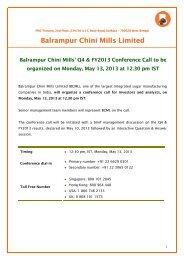Interview With a Trading Legend - Mercenary Trader
Interview With a Trading Legend - Mercenary Trader
Interview With a Trading Legend - Mercenary Trader
You also want an ePaper? Increase the reach of your titles
YUMPU automatically turns print PDFs into web optimized ePapers that Google loves.
<strong>Interview</strong> <strong>With</strong> a <strong>Trading</strong> <strong>Legend</strong><br />
Page 31 of 38<br />
mercenarytrader.com<br />
Part VIII: Peter <strong>Interview</strong>s Jack and Mike<br />
And now, the finale!<br />
In this final installment of the “<strong>Interview</strong> <strong>With</strong> a <strong>Trading</strong> <strong>Legend</strong>” series, Peter poses questions to Jack<br />
and Mike, with topics ranging from matters economic and philosophical, to life outside trading, to<br />
perspectives on mechanical versus discretionary approaches.<br />
PETER BRANDT: Can you ever imagine not being a trader?<br />
JACK SPARROW: To give some background: There are two reasons I fell in love with trading. First, I<br />
was enthralled by the idea of “making money by thinking.” Second, the world is such an inherently<br />
fascinating place that trading served as a gateway for learning about everything else.<br />
Prior to discovering markets, I had never conceived of a business where, to be truly good at it, you<br />
could benefit from learning psychology, math, history, engineering principles, analogies to physics and<br />
biology and so on… it is just the most fascinating game in the world.<br />
So I have a hard time imagining not wanting to be a trader because I am so in love with the game. But<br />
if that period ever came, where I felt I had accomplished everything I sought out to do in markets, I<br />
would move on in pursuit of some other even bigger game. I have sometimes played around with the<br />
idea of, say 30 or 40 years from now, tackling the deeper waters of philosophy, or further exploring the<br />
human mind or something like that.<br />
But my love of trading remains rooted in “truth being stranger than fiction” and the world just being an<br />
intensely interesting place – so at least for now, I can’t conceive of any other game that holds as much<br />
appeal.<br />
MIKE McDERMOTT: From a similar standpoint, I have always been both an analytical person and a<br />
very competitive person. I have older brothers and younger brothers, and whether it was sports or a<br />
game you play after dinner or what have you, mom would ask, “Does it always have to be a<br />
competition with you guys?” And the answer was yes, it does!<br />
I love the competitive aspect of trading. Not necessarily always competing against other traders,<br />
though that is certainly fun, but “How did I do, how could I have done, and how could I make it better.”<br />
Because all the lessons are applicable for the next set of trades.<br />
So I can’t really imagine another line of business I would rather be in… the other thing about trading is<br />
that there is always something new happening. There is always something new to analyze, a different<br />
set of scenarios – every day is different. There are the same principles that you apply, but there are no<br />
boring days. So I love that there is such a dynamic range of vehicles and patterns to follow.<br />
JACK SPARROW: The ultimate game…<br />
PETER BRANDT: You asked what personality traits are attributed to success: I think one of those is<br />
competitiveness, and I really relate to what Mike just said. My wife says, “Can’t you do anything with<br />
your sons without making it a match?” When they first beat me at ping pong it was because they beat<br />
me – I wasn’t going to let them win. Everything we do is competition. <strong>Trader</strong>s are naturally competitive.<br />
Here is a philosophical question, or rather a statement, posed by traders who are a lot smarter than<br />
me: “The purpose of capital markets – their main function in history – is to redistribute wealth from the<br />
many to the few. And if that ever ceased to be, capital markets would cease to exist.”<br />
How do you react to that statement?<br />
Copyright © 2011 <strong>Mercenary</strong> <strong>Trader</strong> - All Rights Reserved
















